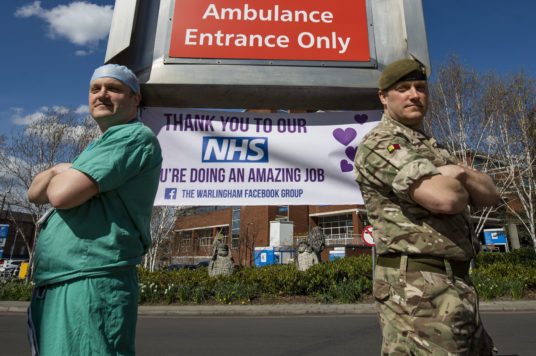St George’s surgeon and soldier twin brother on COVID-19 front line
- Twin brothers, soldier and surgeon, come together to help save lives
- Vascular surgeon twin brother on standby to support medics at NHS Nightingale
- British Army officer who, alongside fellow soldiers, helped build NHS Nightingale
Twin brothers, one a soldier the other a surgeon, have joined forces on a mission to save lives at the new NHS Nightingale London hospital.
British Army officer Lieutenant Colonel Phill Moxey MBE QCVS, Commanding Officer of 1st Battalion, The Royal Anglian Regiment, “The Vikings”, led a team which helped turn the Excel Centre into a 4,000 bed hospital.
And now his brother Paul, a highly respected vascular surgeon at St George’s Hospital, London, is currently on call to aid the new hospital’s dedicated medical team which received its first patients yesterday.
The Suffolk born brothers, both 42, made radically different career choices as children and this is the first time their individual skills, honed over decades in different fields, have been unified in one mission.
Lt Col Phill, older of the two brothers by 20 minutes, who has served on operations in Northern Ireland, Iraq and Afghanistan, said: “Our soldiers have thrown themselves in to this effort with passion and energy to make sure our teammates across government and, most importantly, the NHS get what they need.
“We have had their backs from the start and we will stay in it with them together until the end.”
At its peak there were up to 160 soldiers on site from five different Army Units. As the build phase now comes to an end the Battalion will stay alongside the NHS as the new hospital gets up and running to make sure they continue to get the support they need.
Meanwhile his twin brother Paul will be on call to help NHS Nightingale’s medical staff, ready to go and review patients at a moment’s notice. He was full of praise for the joint NHS and Army effort that made NHS Nightingale a reality.
Paul, married to a nurse and father of three, said: “I think the Nightingale is a triumph for NHS England and the Army team that have put it together so quickly.
“It shows what we can do as a country when we put our minds to it and has taught the NHS a lot about breaking out of the silos we all work in and collaborating with other teams to achieve a common goal. Long may it continue after Covid is defeated.”
Work for Paul now is very different from his normal day-to-day activity. He said: “Our junior doctors have been taken to support Intensive Care, so we have had to relearn the administrative tasks that dog a junior doctor’s life.”
“Having said that, there is a great atmosphere of camaraderie and team work at St George’s and the vascular surgeons are very happy to possess the skills to help support our ICU colleagues with vascular access procedures and do our part in this crisis.”
The pair say they both fell in love with their careers as children. While Phill was set on the Army his brother Paul committed to becoming a surgeon after completing work experience at Papworth Hospital, Cambridgeshire, and witnessing Sir Terence English, who led the team that performed Britain’s first successful heart transplant, perform open heart surgery.
Paul said: “I was blown away by the surgery, the technology and the teamwork and I made my mind up at that point that medicine was what I wanted to do.”
Lt Col Phil, also a married father of three (which includes a set of twin boys), added: “It’s not lost on either of us the apparent utter contrast in our chosen professions – soldier vs surgeon.
“But both roles have taken many years of experience to get to and both have required a degree of sacrifice, patience and tolerance on the home front.
“Neither of us could have got to where we are without the support of our families. Both roles require calmness under pressure, leadership and constant education.
“How we find perspective, maintain self-discipline, willingly take sensible risks day in and day out but ultimately never give up and keep the needs of our nation at the forefront, are the similarities.”
The brothers are in total agreement that the best way to meet the needs of the nation right now are for as many of us as possible to stay at home, to protect the NHS in order to save lives.
Notes to editors
NHS and DHSC with close assistance from the Armed Forces has turned the Nightingale facility from a concept to a reality.
For more information or photos, please contact:
Pippa Harper, Media Manager at St George’s, via philippa.harper@stgeorges.nhs.uk
Melissa Terry, Senior Media Officer at Ministry of Defence, via 07980939783 or melissa.terry670@mod.gov.uk


